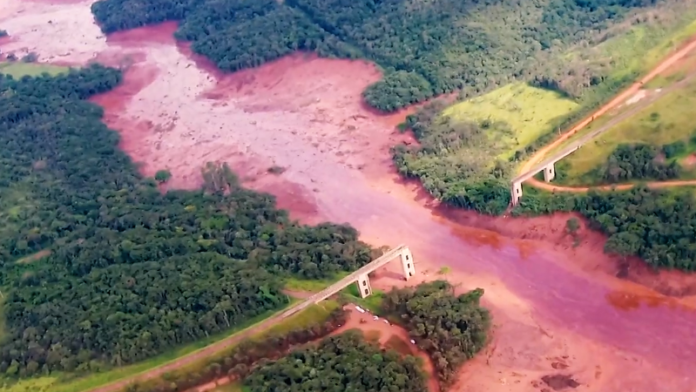
THE Brumadinho dam disaster in Brazil on January 25 could have some far-reaching consequences, but Anglo American CEO, Mark Cutifani, said that the impact on the group’s own activities in the country would be limited.
Brumadinho is the place where Brazil’s state-owned mining company, Vale, operates its Feijao iron ore mine which, in turn, is part of the Paraopeba complex. The complex produced 26.2 million tonnes (Mt) of iron ore in Vale’s 2017 financial year, representing 7% of its total output.
It’s the second major tailings dam burst disaster in just over two years in Brazil. In the previous event, a tailings facility burst at Samarco – an operation owned by Vale in joint venture with BHP. Some 19 lives were lost.
The financial implications of the Samarco disaster have been significant with both Rio and BHP paying remediation under the $1.4bn Renova programme. Litigation with additional potential financial sanction also remains outstanding.
According to the most recent estimates, some 150 people were killed at Brumadinho and around 180 more remain missing. The impact of the event sent iron ore prices some 18% higher and whilst the focus remains on securing the area and managing the human face of the tragedy, the focus may shift in time to the permitting regime in Brazil.
“Post the Samarco event, the permitting climate in Brazil already became more challenging, but I think Anglo American has been successful managing through Minas Rio,” said Anglo’s Cutifani in reference to the UK-listed group’s iron ore mine. He added that whilst Anglo was still required to permit new lifts at its tailings facility at Minas Rio, the technology developed at the mine was different to that at the Vale mines.
Cutifani said he had confidence in Anglo’s tailings technology. “We do an independent technical review every 12 months. Where people are talking about independently verifying these dams, we are already doing it,” he said. “What’s happened is a tragedy. We don’t know details about it, but we’ve got strong internal controls on our facility,” he said.
Anglo re-opened its Minas Rio iron ore pipeline in the fourth quarter of the 2018 calendar year following a leak of slurry that resulted in its shut-down for most of the year, at a cost to pretax earnings of $400m.
In the meantime, there’s speculation as to how the Brumadinho event will continue to influence the iron ore market. “All else equal, this could put upwards pressure on iron ore prices, including pushing iron ore into deficit should a prolonged stoppage occur,” said Goldman Sachs in a recent report.
The Brazilian government has ordered the suspension of the Corrego de Feijao iron ore mining facility and fined Vale $66m. State prosecutors are also looking to freeze $1.3bn in Vale’s accounts for handling damages.
Said RBC Capital Markets: “We do see potential that Vale’s overall production may lag in the coming months as the company refocuses on safety”.
However, the Canadian bank thinks that a rise in short-term iron ore prices notwithstanding, the iron ore market’s project 59Mt surplus for 2019 will continue to put downward pressure on prices.










